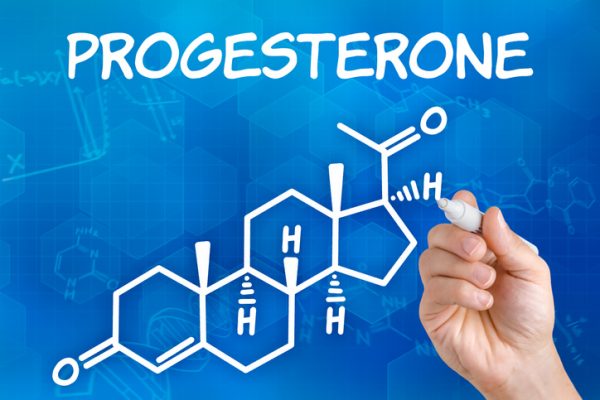By: Cat Ebeling, RN, MSN-PHN, co-author of the best-sellers: The Fat Burning Kitchen, The Top 101 Foods that Fight Aging & The Diabetes Fix
The conventional medical mindset has always held that for women, the uncomfortable perimenopause and menopause symptoms women experience, result from an estrogen deficient as the ovaries start to shut down.
In reality, this is wrong.
During the ten years or so of perimenopause, (‘pre-menopause’), progesterone, a major female hormone that helps to balance estrogen, begins to drop. This is not a small drop, but more like it drops off a cliff. In fact, progesterone levels can plummet to nearly zero levels in the body.
While estrogen decreases slowly during perimenopause and menopause, the fact of the matter is that estrogen levels do not fall as dramatically–until after a woman’s last period–and even then they only fall about 40% or so, overall.
This creates a condition called “estrogen dominance” where the natural ratio of estrogen and progesterone become way out of balance. This means there is too much estrogen relative to progesterone. The symptoms can start years before menopause actually occurs. It is estimated that about 80% or more of women in the United States and Europe and other industrialized societies suffer from low progesterone and estrogen dominance.
What are the Symptoms of Low Progesterone?
The symptoms listed below affect many different body systems in the body, including the brain. Many women in their thirties and forties find that they experience moderate to severe symptoms of low progesterone. The symptoms include:
- Decreased sex drive
- Irregular, heavy menstrual periods
- Bloating (water retention)
- Fibrocystic breasts
- Headaches/Migraines
- Mood swings–irritability, anxiety and depression
- Weight gain, particularly around the abdomen and hips
- Low thyroid symptoms
- Foggy thinking, memory loss
- Fatigue
- Insomnia
Estrogen dominance can lead to a condition of increased inflammation, sudden onset allergies, autoimmune disorders , uterine cancer, ovarian cysts, ovarian cancer, breast cancer, increased blood clotting, increased risk of heart disease, strokes, and accelerated aging.
What Causes Estrogen Dominance
In a normal menstrual cycle, estrogen is the dominant hormone for the first two weeks leading up to ovulation. Once ovulation occurs, estrogen is balanced out by progesterone during the last two weeks of the cycle.
As a woman enters perimenopause and menopause, anovulation begins (cycles where no ovulation occurs) and estrogen goes unopposed, causing many unpleasant symptoms. In industrialized countries such as the United States, there can be many other causes of estrogen dominance that contribute to this condition including:
- Excess body fat
- Too much stress, which depletes progesterone
- A low-fiber diet that doesn’t allow the body to rid itself of estrogen
- Birth control pills, patches, or other synthetic estrogen therapy
- Environmental agents called Xenoestrogens (artificial estrogens), from plastics, toxins in food and water, petroleum products, laundry detergent, cleaning supplies, pesticides, weed killer, and personal care products such as lotion, make-up, nail polish, shampoos and soaps.
Estrogen Dominance Happens in Men Too
Although estrogen is typically a female hormone, men also have small amounts of estrogen and progesterone. When a man typically reaches his forties, both progesterone and testosterone levels begin to decline. This is when a man can become estrogen dominant. Symptoms of estrogen dominance for men include:
- Weight gain
- Loss of sex drive
- Erectile dysfunction
- Infertility
- Fatigue
- Brain fog
- Insomnia
- Irritability
- Man boobs
- Depression
- Anxiety
Estrogen can stimulate cell growth and cause prostate enlargement, prostate cancer and even breast cancer. Excess estrogen in men can also raise the risk of heart disease and osteoporosis.
How to Get Back in Balance
Helping your body to rid itself of excess estrogen, lowering stress, and making some lifestyle changes should help regain hormonal balance, and alleviate many of the symptoms of estrogen dominance. Here’s how:
- Follow a hormone-balancing diet:
- Eat lots of fresh fruits and vegetables.
- Get adequate protein from natural sources.
- Include healthy fats (omega 3 and saturated fats) and eliminate inflammatory omega 6 seed oils.
- Avoid all sugars and processed foods.
- Eat lots of fiber. Excess estrogen is processed by the liver and excreted by the bowel; if stool remains in the bowel, estrogen is reabsorbed into the body.
- Use transdermal 2% bioidentical progesterone cream: Many of the symptoms of estrogen dominance can be relieved with a natural, over-the-counter, bioidentical progesterone, 2% cream. (For men and women)
- Lose excess body fat and get regular exercise — Strength training, in particular, helps build muscle and stronger bones.
- Detoxify your liver: Protect your liver and help it eliminate toxins such as alcohol, drugs, caffeine, or environmental agents, so it can help you eliminate excess estrogen.
- Decrease stress: Stress causes higher than normal levels of cortisol in the body. Progesterone is a pre-cursor to cortisol, so stress will drain the body of progesterone. Even a 10-minute meditation practice every morning can do wonders to ease stress, change your mindset and create a positive attitude.
If these measures do not cause a significant reduction in symptoms, it may be time to visit your health practitioner to get lab work done for hormone levels.
 thenutritionwatchdog.com What's in your food? Discover which "healthy" foods are harming your health and which foods protect your body
thenutritionwatchdog.com What's in your food? Discover which "healthy" foods are harming your health and which foods protect your body 
well my friend how about try the curcumin polyphenol that get rid off the inflamation for good or pure MORINGA because i believe because the science and science doctor behind it.